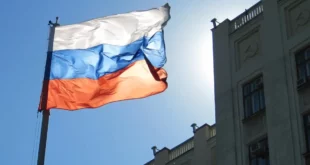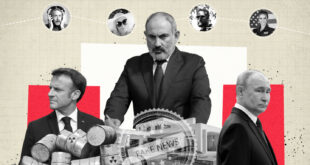 Russia’s pro-Kremlin mass media lauded the recent NATO decision in Bucharest to delay issuing Membership Action Plans (MAPs) to Ukraine and Georgia, hailing it as a victory for departing President Vladimir Putin.
Russia’s pro-Kremlin mass media lauded the recent NATO decision in Bucharest to delay issuing Membership Action Plans (MAPs) to Ukraine and Georgia, hailing it as a victory for departing President Vladimir Putin.
However, many serious pundits in Russia have been less smug. They appear to regard the objections formulated by Germany and France as temporary obstacles and think that NATO remains bent on including Kyiv and Tbilisi around its table. Ukraine is of particular concern, because, as the emerging neo-nationalist ideology in Russia argues, without that country, Moscow cannot restore its status as “the center of power in Eurasia.”
Â
“NATO membership for Ukraine means death for Russia,” nationalist publisher Aleksandr Prokhanov has said.
Â
At the same time, Russia’s ruling elite is acutely aware of its significant geoeconomic interests in Ukraine, particularly since Ukraine and Belarus are the main conduits for Russian hydrocarbon exports to Western Europe.
Â
Finally, Putin has a personal stake in the outcome. During Ukraine’s 2004-05 Orange Revolution, Putin personally intervened on the side of then-Prime Minister Viktor Yanukovych, who led the “anti-Orange” camp. The failure of that heavy-handed intervention was presented around the world, including in Russia and Ukraine, as a major foreign-policy fiasco for Moscow. Media reports at the time indicated that the failed effort in Ukraine was coordinated by Putin’s then chief of staff, Dmitry Medvedev.
Â
Russian analysts realize that support in the United States for Ukraine’s eventual NATO membership is not limited to the George W. Bush administration. It has bipartisan backing in both houses of the U.S. Congress, both of which this year passed resolutions of support. Russian media have noted that all the remaining U.S. presidential candidates — Senators John McCain (Republican, Arizona), Hillary Clinton (Democrat, New York), and Barak Obama (Democrat, Illinois) — support NATO membership for both Ukraine and Georgia. Obama was an initiator of the corresponding resolution in the Senate.
Â
In addition, the concluding document of the NATO summit in Bucharest, which was endorsed by all NATO members of both “old” and “new” Europe, clearly states that Ukraine and Georgia should become members of the alliance.
Â
Russian pundits have also noted with concern that, although a majority of Ukrainians still opposes NATO membership, that majority is slipping. The pro-Kremlin news agency RosBalt earlier this month published research that indicates the percentage of Ukrainians actively opposing membership has fallen from 70 percent to 35 percent in the last two years. Other research indicates that 60 percent of Ukrainians oppose joining NATO while 40 percent favor membership.
Â
Moreover, the Ukrainian government is working to continue turning this tide. President Viktor Yushchenko told Germany’s ZDF television recently that he thinks the percentages can be reversed within two years. Yushchenko’s belief is well-founded, as the country’s political elite — with the exception of left-leaning parties — is solidly pro-NATO and Ukrainian media — which, unlike Russia’s, are genuinely independent — broadly support membership.
Â
Observers in Moscow have also expressed concern that the traditionally pro-Russian elements in Ukraine have been antagonized by the recent gas wars and various other clumsy efforts initiated by Moscow. In October, for instance, the pro-Kremlin Eurasian Youth Movement (ESM) entered Ukraine and vandalized some state symbols at the summit of the country’s highest peak.
Â
The protest outraged the Ukrainian authorities and public opinion, especially after press reports suggested that the instigator of the action was International Eurasian Movement leader Aleksandr Dugin. The ESM is part of Dugin’s umbrella organization. In the wake of the scandal, Putin fired Modest Kolerov, the head of the presidential-administration department in charge of ties with CIS countries who had enlisted Dugin as an adviser.
Â
Pro-Kremlin propagandists also emphasize the idea of a “military threat” from the alliance, even though some of Russia’s top defense officials are skeptical of such a threat. First Deputy Prime Minister and former Defense Minister Sergei Ivanov, for instance, said in April 2007 that Russia faces no military danger on its Western borders, saying that the real potential danger lies in the Far East and the Pacific region.
Â
“It is true,” Ivanov said, “that we have NATO [in the west], but we have acceptable relations with it and a system of treaties and mechanisms has been established.” This assessment, made during a speech in Vladivostok, went little noticed by the central mass media. As a result, a significant segment of Russian public opinion is convinced the Western alliance presents a military threat to Russia.
Â
Meanwhile, the war of words is continuing. CIS Institute Director Konstantin Zatulin debated Anatoliy Hrytsenko, chairman of the Verkhovna Rada National Security and Defense Committee, recently on NTV. Hrytsenko laid out a passionate defense of the pro-NATO position.
Â
“The richest people in both Russia and Ukraine long ago made the decision in favor of NATO,” Hrytsenko said. “Their children study in universities in NATO [countries]. They buy property and yachts in NATO. They send their wives to give birth in NATO countries. They buy soccer clubs in NATO countries. Do you think the citizens of Russia are stupid? If not, then you are. How long will you continue to inflict Soviet-propaganda stereotypes on them?”
Â
Unable to respond logically, Zatulin simply accused Hrytsenko and Ukraine of “treason.” In general, Russian media hit the theme of Ukraine’s “treason” heavily in the days surrounding the Bucharest summit.
Â
In refusing MAPs for Ukraine and Georgia, NATO explained that the step is unwarranted because of “unfavorable public opinion [in the two countries] and unresolved ethnic conflicts.” Since Moscow feels it can do little to turn the current tide of public opinion in Ukraine, policy analysts are looking at the second issue. The Kremlin has successfully manipulated “unresolved ethnic conflicts” in Abkhazia, South Ossetia, and Kosovo to advance its geopolitical interests.
Â
In a March 31 article in “Izvestia,” Moscow Mayor Yury Luzhkov, who is a leader of the pro-Kremlin Unified Russia party, urged Moscow not to extend its treaty of friendship, cooperation, and partnership with Ukraine. That document expires on April 1, 2009. The 1999 treaty establishes the border status of the Crimean Peninsula and the right of Russian Black Sea Fleet to use its base at Sevastopol. Luzhkov argued that withdrawing from the treaty would allow Russia to reopen its territorial claims on Crimea, which has an ethnic-Russian majority and was part of the Russian Soviet Federal Socialist Republic (RSFSR) during the Soviet period.
Â
The day after Luzhkov’s article appeared, some Duma deputies made similar arguments in hearings on the question of Ukraine’s possible NATO membership.
Â
On April 7, “Kommersant” reported that Putin had questioned Ukraine’s right to exist during a closed-door Russia-NATO Council meeting in Bucharest. Citing an unidentified NATO source, the daily said Putin told his counterparts that in order to prevent Ukraine from joining the alliance, Russia was prepared to claim the eastern and southern parts of the country. “Ukraine will cease its existence as a state,” Putin purportedly said.
Â
Ukraine’s reaction to the report was surprisingly muted. Verkhovna Rada speaker Arseniy Yatsenyuk told journalists in Moscow that he does not consider such threats “realistic,” adding that the idea of splitting Ukraine is “illusory.” In fact, Yatsenyuk has good reason to be sanguine. The Ukrainian public and the political elites are united in opposing any division. Even the pro-Moscow Party of Regions and the pro-Russia oligarchs of eastern Ukraine have little taste for division. Perhaps more importantly, a split Ukraine would not satisfy Russia’s economic interests, since even the rump western portion would be able to disrupt flows of Russian energy exports to Western Europe.
Â
This does not mean that Russia will stop playing this card. Vladimir Batyuk, an expert with the Institute of the U.S.A. and Canada, has said the Kremlin’s goal is to split the alliance as deeply as possible on the issue of further eastward expansion, not the absorption of Ukrainian territory. In fact, he added, the Kremlin does not want to see too great a weakening of the alliance, to say nothing of its disintegration: “If NATO disintegrates or is defeated in Afghanistan, then Russia will face a Taliban threat again, just as it did eight years ago.”
Victor Yasmann
Source: RFE/RL
Kavkaz Center
 Eurasia Press & News
Eurasia Press & News



